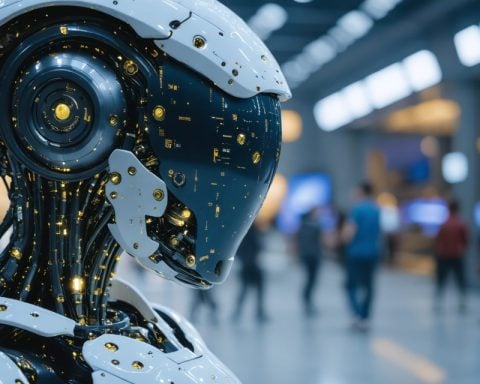Alibaba’s Tech Revolution: Environmental and Societal Impacts of AI and the Metaverse
Alibaba’s ambitious incorporation of Artificial Intelligence (AI) and the Metaverse into its e-commerce operations stands to profoundly influence the environment, reshape societal interactions, and create substantial economic shifts. These technologies promise to redefine not only corporate profitability but also how humanity interacts with retail and digital realms, pointing toward a potential future where technology is deeply interwoven into the everyday fabric of life.
Environmental Impacts: Digital Efficiency and Resource Consumption
AI’s integration into Alibaba’s operations can lead to significant environmental benefits primarily through enhanced efficiency. By automating routine tasks and optimizing supply chains, AI systems reduce waste and improve resource management. Predictive analytics can forecast consumer behaviors, allowing for more accurate inventory management and reducing excess production that contributes to environmental degradation. This technological precision could lead to a reduction in carbon footprints associated with transportation and logistics, a noteworthy advancement in tackling climate change.
However, the environmental benefits of AI must be weighed against the energy consumption required to power these advanced technologies. Training AI models and maintaining virtual environments in the Metaverse can be resource-intensive, demanding substantial computational power and thus increasing electricity usage. The shift toward green energy sources for data centers could mitigate these concerns, a critical consideration for the sustainable deployment of these innovations.
Societal Effects: Bridging Physical and Digital Realities
Alibaba’s foray into the Metaverse aims to blur the lines between physical and virtual worlds, transforming consumer experiences and social interactions. A virtual shopping experience could offer unprecedented convenience and accessibility, democratizing access to goods and services regardless of geographical location. This digital transformation can bridge gaps and create inclusivity, enabling a global marketplace where products from around the world are just a click away.
Such developments, however, also prompt reflection on societal impacts, such as the potential for increased screen time and its implications on mental health and social cohesion. As the Metaverse grows, maintaining meaningful human interactions and community-driven activities will be essential to counterbalance the effects of digital immersion.
The Environmental Implications of Alibaba’s AI and Metaverse Revolution
Incorporating AI and the Metaverse into Alibaba’s e-commerce ecosystem heralds a new era of digital efficiency, reshaping not only commerce but also leaving lasting effects on the environment. The ability of AI to optimize supply chains and enhance resource management holds promise for reducing waste, improving efficiency, and altering the carbon footprint of global commerce. This evolution points us towards a future where technology serves as a pivotal ally in addressing environmental concerns, though it also brings new challenges to sustainability efforts.
Environmental Impact and the Future of Humanity
AI, with its potential to automate processes and provide precise data for decision-making, offers significant opportunities for environmental conservation. By employing predictive analytics, businesses can better forecast demand and streamline their operations, leading to minimized surplus production. This reduces the unnecessary exploitation of natural resources and contributes to combating climate change by curtailing emissions from production and logistics.
This cutting-edge technology, however, does not come without its environmental costs. The training and operation of AI models require substantial computational resources. Immersive digital environments like those proposed in the Metaverse consume vast amounts of electricity, primarily when supported by conventional energy grids. The environmental footprint of these technologies could increase unless there’s a strategic push towards renewable energy for powering data centers.
Through a shift to green energy solutions, businesses can significantly reduce the carbon emissions associated with AI and Metaverse operations. Clean energy initiatives offer a sustainable path forward, yet they require global cooperation and significant investment. Should these technologies continue on their current trajectory, the demand for renewable resources will inevitably rise, offering fertile ground for innovation and investment that aligns with environmental objectives.
The future of humanity may well depend on these technological ecosystems adapting toward eco-friendly practices. Embracing AI and the Metaverse responsibly could spark a new green revolution, where technology serves as both a tool and partner in the quest for sustainability. It underscores an evolving narrative where economic progress and environmental stewardship are not mutually exclusive but rather inextricably linked.
Ultimately, how we balance the demands of these technological advancements with global environmental goals will shape the legacy we leave for future generations. If harnessed wisely, the convergence of AI and the Metaverse into daily commerce could lead to not just a transformative consumer experience but also a planet where digital and ecological wellbeing coexist.
Inside Alibaba’s Technological Transformation: Key Trends, Insights, and Future Prospects
Key Innovations and Future Trends in AI and the Metaverse
In 2023, Alibaba’s integration of AI and the Metaverse within its ecosystems extends beyond traditional e-commerce applications. Emerging trends indicate that these technologies could revolutionize various market sectors, offering fresh opportunities for innovation and sustainability. Below, we explore some of the lesser-discussed aspects of this technological transformation.
AI Innovations: Advancements and Emerging Use Cases
While the environmental benefits of AI in optimizing supply chain operations are well-documented, Alibaba is advancing in creating AI-driven tools for customer service. The development of advanced chatbots and virtual assistants aims to enhance customer interactions by providing personalized recommendations and support, reducing response times, and improving overall satisfaction.
Additionally, Alibaba is exploring AI applications in content creation, using natural language processing to generate product descriptions, marketing materials, and customer reviews, saving significant human labor and allowing a deep focus on creativity and strategy.
Metaverse Speculations: Expanding Beyond Retail
Alibaba’s investment in the Metaverse is not restricted to enhancing shopping experiences. Foreseen developments include virtual reality spaces for educational purposes, immersive training sessions for employees, and virtual offices for remote work. These applications not only promise to redefine the workspace but also create interactive learning environments, leading to more flexible education and work-lifestyle integration.
Security and Privacy in a Digital World
As AI and virtual environments require vast data processing, security remains a paramount concern. Alibaba is investing heavily in strengthening its cybersecurity frameworks to protect user data and enhance privacy. Insights suggest a focus on developing decentralized ledger technologies like blockchain to secure transactions and personal information, benefiting both consumers and stakeholders.
Sustainability Efforts: Green Technology Integration
One of Alibaba’s critical strategies involves integrating renewable energy sources into its data center operations. By adopting solar and wind energy, they aim to reduce reliance on fossil fuels, consequently decreasing the carbon footprint associated with maintaining AI systems and virtual environments. These commitments underscore the importance of sustainability in technology development.
Market Analysis: Economic Shifts and Industry Impact
The economic implications of integrating AI and the Metaverse within Alibaba’s operations are multifaceted. Analysts predict a significant impact on the retail sector, with potential ripple effects in logistics, marketing, and customer service industries. As these technologies mature, companies may adopt similar approaches, increasing competition and accelerating the shift towards digitalization across global markets.
Conclusion and Predictions
The incorporation of AI and the Metaverse into Alibaba’s strategic framework suggests a transformative era on the horizon. Continual innovation, coupled with a commitment to sustainability and security, positions Alibaba as a leader in the technology space. Predictions for the next decade include an increased reliance on virtual environments for various applications, with AI acting as a cornerstone for personalization and efficiency.
For more details on Alibaba’s initiatives and innovations, visit the Alibaba main page.











